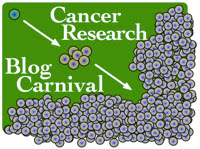 Some interesting papers have been popping up on the peer-reviewed-osphere connecting innate antiviral immunity to stem cell turnover. First, a publication in Nature from Essers et al. (1) shows that interferon alpha, a critical anti-viral cytokine that is robustly induced by viral infection, re-activates dormant stem cells in the mammalian bone marrow. Second, data from Buchon et al. (2) in Cell Host and Microbe show that stem cells in the Drosophila gut are induced to proliferate following oral infection with a Gram negative bacterium. Intriguingly, the conserved Jak-Stat kinase signalling pathway is implicated in both phenomena, suggesting an ancient relationship between innate immune and stem cell regulatory pathways.
Some interesting papers have been popping up on the peer-reviewed-osphere connecting innate antiviral immunity to stem cell turnover. First, a publication in Nature from Essers et al. (1) shows that interferon alpha, a critical anti-viral cytokine that is robustly induced by viral infection, re-activates dormant stem cells in the mammalian bone marrow. Second, data from Buchon et al. (2) in Cell Host and Microbe show that stem cells in the Drosophila gut are induced to proliferate following oral infection with a Gram negative bacterium. Intriguingly, the conserved Jak-Stat kinase signalling pathway is implicated in both phenomena, suggesting an ancient relationship between innate immune and stem cell regulatory pathways.This idea of course brings up lots of interesting hard-core biological questions, but since this is the blogosphere I'll throw out the random half-assed sci-fi scenario. Could infectious agents be helping us stay young? Perhaps periodic infections with nonlethal viruses selectively purge our decrepit ageing cells, while simulatenously stimulating their replacement with fresh ones derived from newly activated stem cells. Neutropic viruses might help to prune defunct neurons and thus stave off degeneratvie diseases like Alzheimer's or Parkinson's.
So, I propose a new cure for ageing. Virotherapy with benign, replication competent agents. Much more practical than 18th level magic-user Audbrey deGray's stem cell replacement. Move over StemEnhance, viral anti-ageing cream is on the way!
1. IFN-alpha activates dormant haematopoietic stem cells in vivo. Nature, 2009. Online Feb.
2. Drosophila Intestinal Response to Bacterial Infection: Activation of Host Defense and Stem Cell Proliferation. Cell Host and Microbe, 2009. Vol 5 pg 200.

 Podcast
Podcast




8 comments:
Let me quickly draw a parallel with Skip Virgin's viral symbiosis vs pathogenic bacteria story (e.g. Herpesvirus latency confers symbiotic protection from bacterial infection. Barton ES, White DW, Cathelyn JS, Brett-McClellan KA, Engle M, Diamond MS, Miller VL, Virgin HW 4th. Nature. 2007 May 17;447(7142):326-9) which also is linked to interferon (though gamma, in this case).
Interesting hypothesis. However I'd bet that more viral infections correlate with shorter life expectancy. Am I wrong? Perhaps this is not causal but it makes it a difficult hypothesis to look at.
That's neat stuff re herpesvirus latency and bacterial resistance...I wasn't familiar with that work. I think a good illustration of how much we have to learn about the good viruses do us.
I'd be willing to bet Rob 9 minipreps that there are orders of magnitude more innocuous and helpful viruses than the ones that make us sick. The bad ones just get all the press because they make people die and stuff. It seems likely even that our brains are evolutionarily wired to be hypersensitive to specifically detect the tell-tale signs of BAD virus infections. A bias of natural selection. Our ancestors that didn't notice all the bad infections died sooner and had less success raising kids.
Also, I'd be willing to bet that all the nuclei in your cells, the vast majority of the DNA in your genome and all your sperm cells descend from a long line of viruses. How many good viruses does that count for?
Nine minipreps is kind of a lame bet considering Qiagen does all the work . . . I guess with nine you'll have the annoyance of a "balance" tube.
Considering a virus needs a host to replicate, I think sperm is analogous. That being said, sperm is no more a virus than oocytes a bacteria.
Clearly people here are drinking and blogging...
First of all, Bayman, I agree perhaps much of my DNA is derived from viruses. But there are not lots of beneficial viruses. What is the selective advantage of a virus being helpful to the host? Not getting a bacterial infection because you already have herpes doesn't count. Herpes increases your risk of Bell's palsy and Alzheimer's disease. Survival of the fittest is not an even number of minipreps, it is a nasty affair.
AC- I think the concept of sperm as a virus is interesting to think about... until you sober up. It fails on so many definitions that I'm sure you already know.
Anonymous - You need to go back to centrifuge school, where they teach you that balancing a centrifuge is possible in more than two groups. For example, balancing nine minipreps on a 24 slot centrifuge, samples 1-3 go in slots 1-3, samples 4-6 go in slots 9-11 and samples 7-9 go in slots 17-19. Balance tubes are for the mathematically challenged.
Hopefully Bayman knows this to make his loosing this bet easier.
Just to be a pain in the arse...
Rob - I'm sure you meant "losing".
Besides the point. It is VERY well established that microbes have an important role to play in our immunity. From birth we are inoculated with a veritable horde of bacteria which in most cases are symbiotic (such as lactobacilli in breast milk, clostridium species obtained through vaginal birth etc) which act to kick start the neonatal immune system and protect us from more pathogenic species.
The original hypothesis is very interesting, however I think we're a bit far from using viruses to replace tissues with our woefully undergunned cohort of stem cells and the well documented risks associated with even largely inactivated viruses (can you say papilloma?).
By the way, food for thought perhaps... A species that does not age does not naturally die and therefore does not evolve, ergo aging is a trait that has been selected for from the earliest appearances of the evolution of life... There's an article about that with some interesting mathematical models regarding bacteria... I'd go find it but can't be arsed, it's something like "evolutionary basis of aging".
A species that does not age does not naturally die and therefore does not evolve
I don't think this is correct. A species that doesn't reproduce doesn't evolve. (Of course, unless that species also doesn't die, it will be very short lived)
There are plenty of ways to die "naturally" that don't involve aging. Even an immortal species will evolve. Perhaps not by natural selection, but through other evolutionary mechanisms such as random genetic drift.
That's not to say there's no evolutionary basis for aging, just that aging isn't a requirement for evolution.
Post a Comment